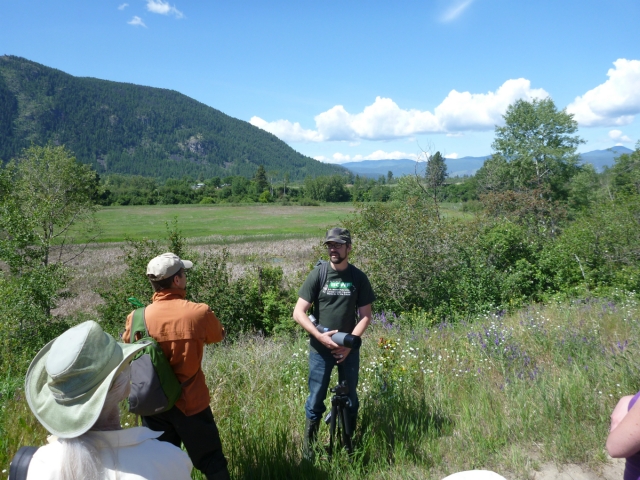Kettle River Q&A – Big ideas on the table for the future of our water supply
On March 11, community members from across the Boundary gathered to learn more about water supply issues in the Kettle River watershed and share ideas about how to ‘sustain the flow’ in the Kettle River. We want to express a big ‘Thank You’ to all of the members of the Boundary communities and the Stakeholder Advisory Group who attended the Special Meeting.
After a welcome from Area ‘E’ Director Bill Baird, we discussed the big picture on water supply, in terms of storage, the natural patterns of flow, and effect of water use on the aquifers and river.
We have no glaciers or major reservoirs. Our water storage consists of the forests, the lakes and wetlands, the aquifers, and the soils. So the melting snow and the spring rains bring a flush of water down the river until the middle of summer, replenishing the aquifers and carrying on to the Columbia River.
Then, very quickly, the flow declines. What was ample water in early August for fish, floaters, and water intakes can decline to a shallow trickle in a matter of weeks.
So what’s going on? As participants discussed, reduced forest cover and more roads over much of the watershed has reduced the natural storage in soils and wetlands, leaving a smaller ‘sponge’ that melts and dries up much more quickly. This is being made worse by warmer winters with more rain and earlier snow melt.
Then as the flow declines, our communities and farms draw increasing amounts of water to grow food, keep lawns green or wash their cars and driveways. That water mostly comes from aquifers, which is water buried in sand and gravel below our communities. But it is all in some way connected to the Kettle River, and a lower water table means less water returning to the river when it is needed most for fish, wildlife, and downstream water users.
So what can we do about it? Participants gathered into groups to discuss four water supply challenges:
1) What are the priority water uses and how do we balance the needs? The biggest priorities were identified as ecosystem health, agriculture & food production, and household/domestic use. The group felt it was especially important to give priority to ‘wise management’ and efficient uses of water, ensure that using water doesn’t compromise its quality, and that a regional watershed authority should have the most say over priority water uses.
2) How do we greatly increase water conservation through innovation, incentives, education, or pricing? This group emphasized education, incentives, and targeting behaviour change through innovative awareness programs, together with the need to measure and meter water use to motivate conservation.
3) How do we store more water in ways that are cost-effective, minimize risks to people and the environment, and provide water to aquifers, ecosystems and people when it is needed most? This group emphasized a mix of improving natural storage on the landscape (wetlands, forests) and building a network of storage structures to recharge groundwater, store some spring floods for later in the season, and reduce water use.
4) How do we prepare for and respond to low river flows and severe droughts? This group placed a great emphasis on planning and preparedness, including education, pricing/metering water, water conservation, groundwater regulation and water use innovations.
The full results of these discussions are being incorporated into our report on ‘Sustaining the Flow in the Kettle River Watershed,’ available later this month, and addressed in the draft Watershed Management Plan in June.
Next up will be the Special Meeting on Floodplain, Riparian and Wetland Issues on April 15 in Grand Forks, 12:00-4:00 – stay tuned at http://kettleriver.ca for details.
– Graham Watt is the coordinator of the Kettle River Watershed Management Plan for the RDKB, and is working with a Stakeholder Advisory Group from across the region to develop the plan. Email plan@kettleriver.ca






















